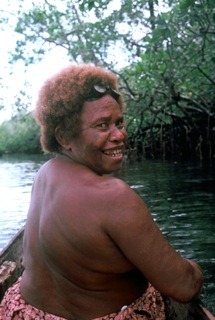Fanalei’s Chiefly Clan and its Salaried National Elite
Since the onset of colonialism and the cash economy, Fanalei’s chiefly clan has been aligning itself with the outside economic and political powers. They started assisting the new British patrolling district officers who preferred recruiting from powerful clans. A disproportionate number of chiefly clan children set off to Anglican boarding schools to learn the new ways of power. As a corollary, by the late 1980s, almost all Fanalei’s salaried national elite hail from the chiefly clan.
 As the core source of cash, credit and “cargo”, the elite have direct influence over their chief who is in charge of local political clan alliances. Thanks to cash and access to credit, chiefly clan members can continue acquiring land and broadening their power base, cementing alliances. In this manner, the modern day ramo system perpetuates itself. These enterprising “home” members buy land for cash-cropping copra and pig farming, reinvesting proceeds in more land, building on local friendships and custom fight/political alliances with bush clans, besides continuing to help out with compensation payments in ongoing feuds. National elite members also have been able to purchase land from their extended national network of alliances and friendships, procuring large tracts outside of Small Malaita (e.g. on Makira, SE Solomons). The Fanalei chiefly clan’s continued control of land as well as the alata has spiked jealousy in the other village clans.
As the core source of cash, credit and “cargo”, the elite have direct influence over their chief who is in charge of local political clan alliances. Thanks to cash and access to credit, chiefly clan members can continue acquiring land and broadening their power base, cementing alliances. In this manner, the modern day ramo system perpetuates itself. These enterprising “home” members buy land for cash-cropping copra and pig farming, reinvesting proceeds in more land, building on local friendships and custom fight/political alliances with bush clans, besides continuing to help out with compensation payments in ongoing feuds. National elite members also have been able to purchase land from their extended national network of alliances and friendships, procuring large tracts outside of Small Malaita (e.g. on Makira, SE Solomons). The Fanalei chiefly clan’s continued control of land as well as the alata has spiked jealousy in the other village clans.
Overall, people have feared tensions created by cash access. The concept of “private” individual accumulated wealth and ownership has been alien and is slow to change. People must share to keep honor, prestige and power. In the act of creating social debts used for alliances, people are considered “generous”. Given the cultural importance of sharing possessions and not taking them as personal property, a selfish person is bluntly called “rubbish man” in Pidgin. In village life, nobody wishes to elevate their material possessions/standard of living far above others. In fear of the “jealous business,” they forego showing off with an abundance of manufactured luxuries, such as mattresses, propane stoves, and fiberglass cisterns to collect rainwater.
Sensitive to the dangers of “jealous business”—the universal evil eye--those with salaried jobs in Honiara told me how they are focusing on the Anglican Church's coupled message of village unity and cash development that avoids competition among clans. The chiefly clan hopes to promote unity through village development in a way that limits interclan rivalry. Yet they still wish to keep up their custom power of “feeding the people” in order to hold onto ranked power and respect. This makes for a difficult move when it comes to managing reef resources, but managing is not on the conscious agenda at this time.
The chiefly clan and their national elite synchronize actions bent on lowering village tension over the cash disparity. They discuss how the other Fanalei clans, who have been less fortunate than themselves, are land-poor and in danger of growing hungry as population pressure on resources in the Passage soars. Wishing to address increasing jealousies at home, they devise a plan to turn alata net-fishing into a cash-making venture for everyone in Fanalei. They hope to translate the custom power of “feeding the people" with giant canoe and net into the modern vernacular of “feeding the people” via a village-wide opportunity to sell alata reef fish.
To this end, the Fanalei national elite based in the capital of Honiara on Guadalcanal buy the village a large used nylon gill-net with illegally small mesh. They cart a large ice chest—eski—to the Honiara wharf and load it onto the listing vessel bound for Malaita. Crossing in the night, circling Malaita and returning to Honiara, it makes this voyage perhaps three times a month. The Fanalei elite alert their home village to expect the ice chest by placing a public announcement on the nightly national radio program. Around the archipelago, villagers stay tuned to this pan-Solomons evening news in a world before cell phones and internet. Their population is still relatively tiny and the degrees of separation are small enough to pass on everything from family deaths to shipping news.
Thus forewarned, Fanalei prepares by net-fishing the alata. They will be standing by with at least 50 kg of fish to fill the eski and put it right back onboard bound back to the cash market. The Fanalei elite carry it to the capital’s fresh fish market where all sells simply.
It seems so easy, with no forethought to overfishing reefs. The alata has always yielded fish. Nobody pays heed to the wildly increased frequency of fishing. Cash is coming into Fanalei as envisioned. Mirroring power to “feed the people,” the Fanalei national elite feel they are expressing largess by running this market that promotes village-wide cash development. Everyone feels it's a success.








